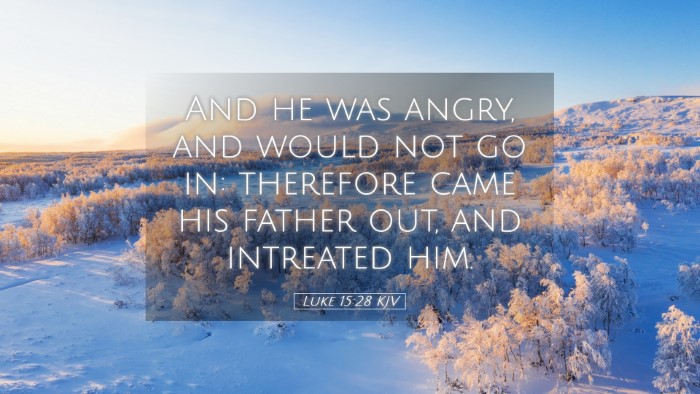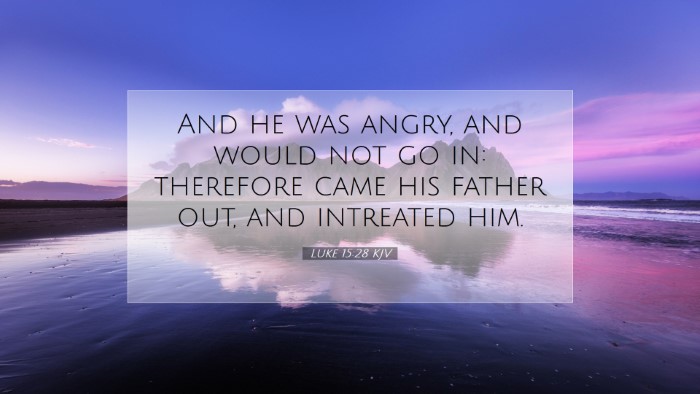Commentary on Luke 15:28
Luke 15:28 states, "And he was angry, and would not go in: therefore came his father out, and entreated him." This poignant verse occurs in the parable of the Prodigal Son, illustrating not only the compassion of the father but the inner turmoil of the older son. The emotions displayed here are multifaceted and rich with theological significance, capturing the essence of a heart at odds with grace.
Contextual Analysis
This verse is set within the broader context of Jesus' teaching to the religious leaders of His time. The chapter narrates the three lost items: a sheep, a coin, and a son. Each story aims to illustrate God's grace in seeking the lost. The older son represents the Pharisees' attitudes towards sinners and the lavish grace God extends to them.
Insights from Public Domain Commentaries
Matthew Henry's Commentary
Matthew Henry highlights the older son’s anger as a reflection of self-righteousness. He notes that the older son is consumed with jealousy and resentment towards his brother, who squandered his inheritance yet is welcomed back with open arms. Henry insists that this illustrates how religious pride can blind individuals to the grace that God offers to sinners. The father's approach to the older son, going out to entreat him, symbolizes God's persistence in seeking to reconcile us to Himself.
Albert Barnes' Notes on the Bible
Albert Barnes articulates that the older son’s anger signifies a deep-seated misunderstanding of the nature of grace and mercy. He points out that the older son believed he deserved greater recognition for his loyalty, failing to grasp that grace cannot be earned or deserved. According to Barnes, this verse emphasizes the folly of measuring one's worth through human standards rather than divine grace. The father's act of coming out signifies God's willingness to meet us in our anger and disbelief, inviting us back to communion.
Adam Clarke's Commentary
Adam Clarke elaborates on the societal implications of the older son’s role. He suggests that the older son’s reaction was typical of the Jewish leaders’ attitudes towards the Gentiles, expressing a disdain for those who repent after a life of sin. Clarke insists that the older son’s refusal to enter the feast mirrors the hearts of those who feel entitled to God's blessings based on their perceived righteousness rather than through faith. He emphasizes that the father’s entreaty symbolizes the persistent love of God, illustrating that everyone is called to partake in His grace.
Theological Implications
- Grace versus Works: The older son is emblematic of those who adhere to a works-based belief system, expecting that their righteousness should earn them favor in God's sight. The reaction invites reflection on salvation through grace alone.
- Emotions and Spirituality: The narrative showcases the legitimate emotions of anger and jealousy, often felt in the face of God's grace bestowed upon others, urging believers to examine their hearts regarding spiritual pride.
- The Father's Love: This verse encapsulates the father's deep love and desire for all his children to experience joy—not just the returning son. It accentuates a universal invitation to fellowship.
- Community and Reconciliation: The story transcends individual relationships, offering profound insights into community dynamics within the church, emphasizing reconciliation and acceptance of all, regardless of past actions.
Practical Applications
For pastors, students, and theologians, Luke 15:28 offers a rich tapestry for discussing the nature of God's grace in practical settings:
- Preaching Grace: Pastors might use this verse to preach about the unmerited favor of God, addressing congregational attitudes toward forgiveness and grace.
- Spiritual Reflection: Students might engage in personal reflection on their own feelings toward others who receive grace, challenging them to embody a Christ-like disposition.
- Community Engagement: The debate about worthiness can serve as a springboard for discussions on inclusiveness, challenging church communities to reflect on how they treat those who come seeking grace.
Conclusion
In concluding our exploration of Luke 15:28, it is essential to recognize the rich interplay between God's grace and human emotions portrayed within this verse. Both the father and the older son compel us to navigate our spiritual journeys with humility and compassion, reminding us that our relationship with God is defined by His grace, not our merit. The invitation to the feast remains open to all, fostering a spirit of reconciliation that challenges the boundaries we often set. May this passage encourage a deeper understanding of God's heart toward both the lost and the righteous, calling all to the celebration of grace.


